Do you have questions about solar energy? The Solar FAQ on this page are designed to provide an overview of solar technology, solar installation, and solar economics, so you’ll have the confidence to go solar.
Don’t see an answer to your solar question? Contact us!
I want to find answers about:
Solar technology
Solar panels are made up of photovoltaic (PV) cells made of silicon. When the sun’s rays hit them, these cells convert sunlight to electricity. Individual cells are wired together to form a solar panel. Panels are typically three feet by five feet. They are coated in tempered glass, which allows them to withstand harsh weather.

The electricity produced by a single solar panel is not enough to power a home or business, so multiple solar panels are needed. The number of panels varies by installation, but every solar system (also called an array) includes a series of panels mounted and wired together. This array may be installed on a roof (rooftop solar) or ground level (ground-mounted solar).
The electricity generated by solar panels takes the form of direct current (DC). However, most appliances and electricity-consuming objects (called electric load) require alternating current (AC). To convert the solar electricity from DC to AC, an inverter is needed. You can choose between two types of inverters: a central, string inverter or a microinverter. While both perform the task of converting electricity from DC to AC, they differ in critical ways:
- Central inverters: receives all electrical output from your entire solar system and converts it from DC to AC at a single, central location. A single central inverter is required for a solar system. It is often mounted on the side of your home or building next to the electric meter. Central inverters are steadfast and affordable, but are susceptible to variations in panel performance. If one panel is shaded and produces less electricity than the others, the total electrical output will drop.
- Microinverters or DC optimizers: help maximize production if shading is a concern. Optimizers are individually mounted to the back of each solar panel. They capture the electricity that flows off each panel so that if one panel is shaded, it will not affect the output of the whole array. DC optimizers work with a central inverter that converts DC to AC. Microinverters convert DC immediately to AC right under the panel. By design, both DC optimizers and microinverters help maximize the conversion of electricity and are useful in situations with variable shading. What’s more, because they allow each panel to operate independently, both make it easy to add more panels to a solar array in the future.
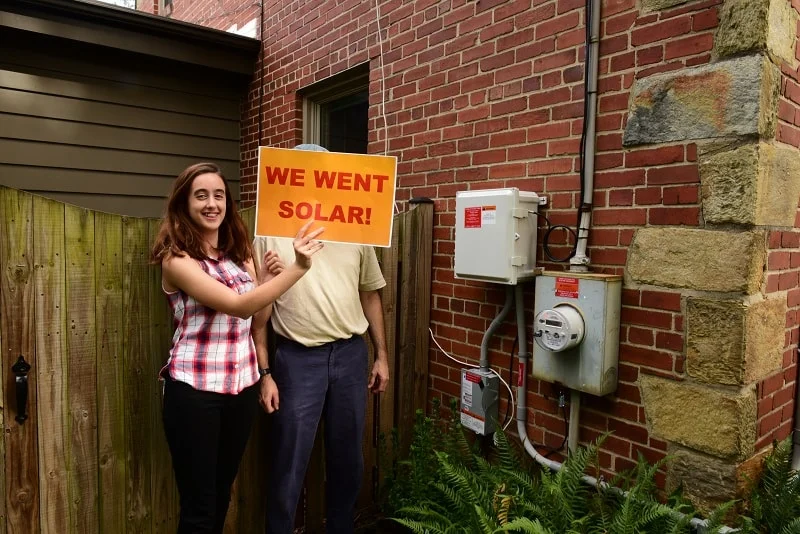
Once electricity is produced by the solar panels and converted from DC to AC by the inverter(s), it will flow through your electric meter and into your home or building. It will be used on site the moment it is created. Any excess will flow back out through your electric meter and onto the local grid.
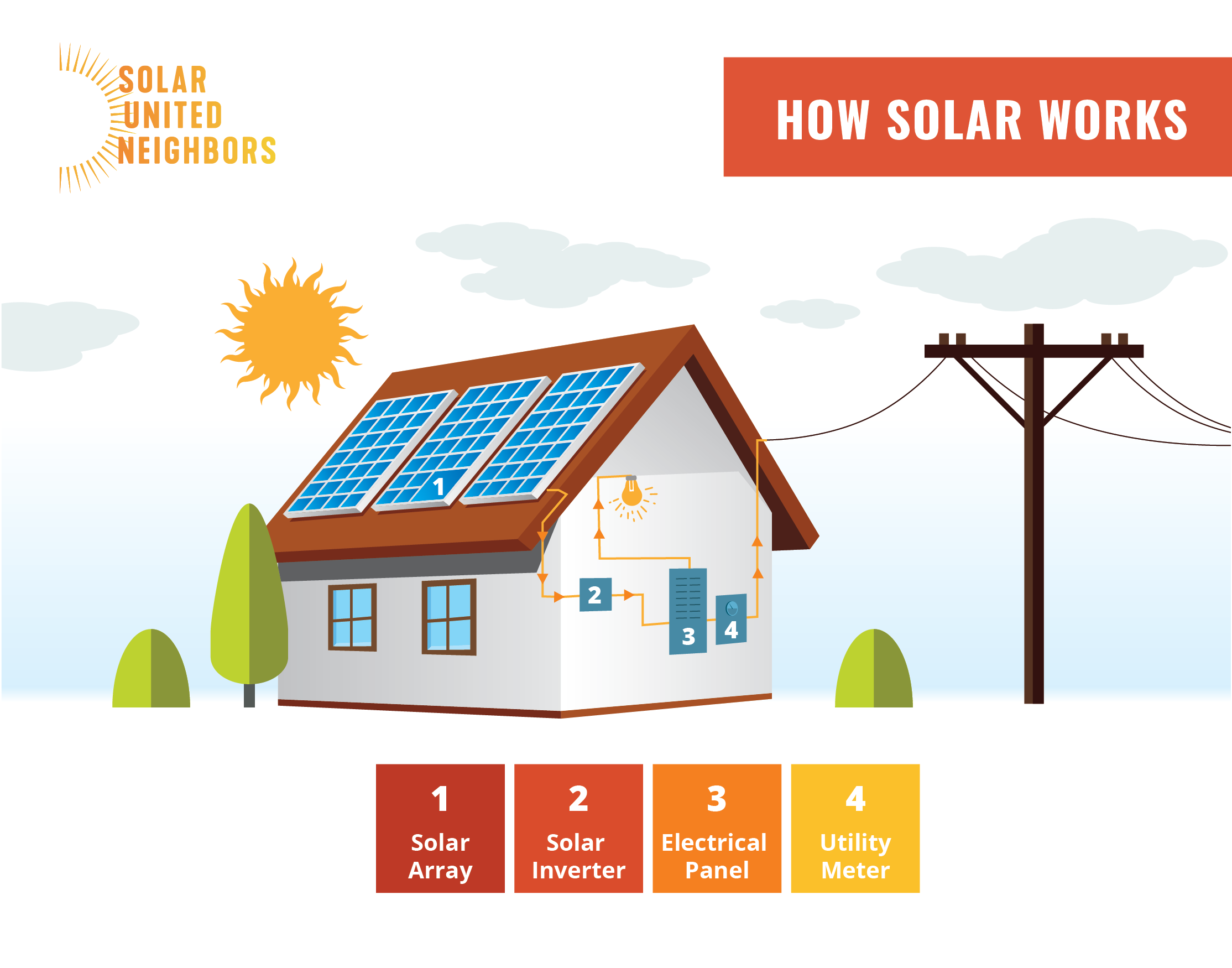
Think of your solar array as a 25-year investment. Solar panels will produce electricity for at least 25 years. Panels continue to generate electricity after 25 years but at a decreasing rate (usually no less than 80% of the first year’s energy production in year 25). While microinverters will likely last for the duration of the PV system, you may need to replace central inverters after 15 years.
Want to know more about solar system warranties? Skip ahead to our warranties question.
Many variables influence the size of your optimal solar array. Before analyzing those variables, you should understand how solar is sized and measured. The electrical capacity of solar panels is measured in watts (W). The typical solar panel is rated at 400-450 W. To get the total power (in watts) of your solar array, add together the wattages of each panel. Let’s say you had 10 400 W panels installed. The total wattage of your system would equal 4,000 W. 1,000 W is equal to 1 kilowatt (kW), so another way to describe the size of that system would be 4kW. The average size of a solar array varies by region but is usually between 6 and 10 kW.
- To determine the ideal size of your system, an installer will estimate how many panels can fit on your roof given its footprint and shade susceptibility. If the size of your roof is limited (meaning fewer panels can be installed), installers can offer high-efficiency panels. These panels will have a higher power rating (typically 450 W), and will produce more electricity per panel.
- Installers will also use geospatial data to determine the optimal system size for your property, as roof orientation and climate factors will affect how much electricity your system produces.
- Budget is the final factor that influences the size of your solar array. Installers work closely with clients to maximize the amount of solar they install for the customer’s budget.
While sizing your solar array, installers will consider how much the solar electrical output will offset your electricity needs. While the power capacity of solar panels is measured in watts (or kilowatts), the amount of electricity produced by the panels is measured in watt-hours (or kilowatt-hours).

You may recognize the term kilowatt-hour (kWh) from your electric bill. Utilities charge their customers based on how many kWh of electricity they consume each month. If you look at your utility bill from any billing cycle, you can see how many kWh of electricity your home or building consumed that month. Each kW of solar you install will produce a number of kWh, which will directly offset your utility electricity consumption. The kW-to-kWh relationship varies with latitude and climate. Your installer will accurately predict how many kWh of electricity your solar panels will produce each year.
To estimate how much solar you can install on your roof (and how much electricity it will produce each year), try the PV Watts tool. To get a sense of how much your solar will offset your electricity needs, divide the annual kWh production estimate by your annual kWh consumption of utility electricity (the sum of 12 monthly bills). View a tutorial.
You earn credit for the solar electricity you generate through a policy called net metering. Net metering allows you to offset your utility electricity consumption with the solar electricity your array produces. When your system generates electricity, that electricity flows into your home or building and is consumed on-site. When your solar panels produce more electricity than your home or building needs, the excess electricity is sent out to the local grid, where it is consumed by neighbors.
You receive full credit for the excess electricity you return to the grid through net metering. Once you install solar, your monthly electric bill will be calculated to reflect: the total amount of electricity you consumed minus the total amount of electricity you produced (i.e., the solar electricity you fed to the grid).
It is common for solar arrays to produce surplus electricity during certain times of the day, months, or seasons. For example, on a sunny day, your panels will produce a high volume of solar electricity during the day. If you are not home you are not consuming that electricity, so solar surplus will flow back to the grid. Net metering enables you to receive credit for these seasonal or daily surpluses. Your utility will then apply those credits to your monthly bill, covering the electricity you purchase at night or during periods of low solar production. Should you have excess credit at the end of a billing cycle, it will roll over to the next month.
By allowing you to offset your utility electricity consumption with your solar electricity production, net metering helps you reap the full financial value of your solar array. Most states have passed laws enabling net metering. If you live in a state with net metering legislation, you are guaranteed the right to net metering, regardless of where you live or who your utility company is. Learn more about state-specific net metering laws.
If you don’t receive retail compensation for the energy you export to the grid, it’s best to consume as much electricity on-site as possible in order to capture the full retail value of the electricity produced. This can be achieved by moving energy intensive tasks — such as doing laundry, washing dishes, heating water, and or heating/cooling air — to maximize your solar energy production.
Solar is a simple, minimum-maintenance technology. Unlike other energy technologies, solar PV does not have moving parts. This means it’s not likely your equipment will fail. You should not have to replace your panels during their lifetime. Wiring is the part of solar PV that most commonly requires maintenance because squirrels and other animals may tamper with it. Depending on your inverter type, you may also need to have your inverter replaced 10 to 12 years after installation. Extended warranties can cover this equipment replacement cost. Ask your installer for details.
In most cases, solar panels do not need to be washed, as rain and snow naturally clean them. In areas with less rain and lots of dust or pollutants in the air, occasional cleaning may improve performance. We do not recommend climbing up to your panels to wash them. If you live in an area where cleaning is needed, contact a solar professional.
Even though solar is low maintenance, we recommend asking your installer or another qualified solar professional to inspect your array every 3 to 5 years to ensure things remain in good operating order. They’ll do a visual inspection of all equipment, check for things like wire damage from critters, and make sure your system is performing properly.
Solar water heaters use the sun’s rays to generate thermal energy or heat. The thermal energy heats up the water, which flows into the home or building for later use. Solar United Neighbors supports the adoption of solar water heating, but does not include this technology in any of our co-op programming. We focus only on solar PV.
Yes, solar panels can be recycled. The Solar Energy Industries Association has additional information on recycling. You can also find information on vendors, equipment donations, equipment resale, and solar recycling facts at SolarRecycle.org.
We expect the options for panel recycling to increase in the coming years, but there will be challenges ahead. The solar industry is young and the market for solar recycling is small. The cost to recycle components and materials from those panels is still high. Additionally, the industry is getting better at using less expensive materials in solar production. While this has the benefit of lowering the cost of solar panels, it also lowers the financial benefit of recycling them.
Governments and the solar industry will need to work together to ensure that solar panel materials are put back into the manufacturing stream. There are good examples of this happening in other more well-established industries. For example, 99% of car batteries are recycled. New automotive batteries are made primarily from recycled materials.
Solar panels can work for 25 years or more. The best way to help with the recycling challenge is to keep your system installed, operating, and making you money for as long as possible. It’s also important to keep the size of the recycling and waste challenge in context. By some estimates, projections for solar panel waste are a tiny fraction when compared to existing waste sources for coal ash, plastic waste, or e-waste (cell phones, laptops, etc.).
Solar panels can be installed on almost any roof material and roof structure (flat roof, pitched roof, etc.). Panels are attached to your roof with a racking system. The best racking system for your home depends on how your roof is structured and the type of roofing material. Your installer will recommend the racking system most appropriate for your property.

The most common roof types that people install solar and special racking considerations include:
- Asphalt shingle roofs
- Most homes in the United States feature pitched (or angled) roofs and are covered with asphalt shingles. Roofers lay shingles in overlapping courses, or rows, that allow water to shed from them, waterproofing your roof. Asphalt shingle roofs are the most common racking arrangement, which includes flashings and rails. Flashing is a sheet of aluminum that slides under several courses of shingles and attaches to the rafters of your roof. Aluminum rails are then connected to a standoff (small metal pole) that attaches to the flashing. Solar panels are laid on top of the rails, and securely connected with clamps.

- Tile roofs
- In warmer parts of the country, clay tile roofing is common. Roofers lay these tiles in courses, or rows, that overlap across your roof. The tiles protect the thick, waterproof underlayment beneath them from the elements. For clay tile roofs, installers use special flashings that feature a hook attachment. The hook extends from between clay tiles and provides an attachment point for aluminum rails. The solar panels are placed on top of the rails ,securely connected with clamps. A special consideration for clay tile roofs is age. Some older clay tile roofs are too brittle to work with and may need to be replaced before installing a solar array.
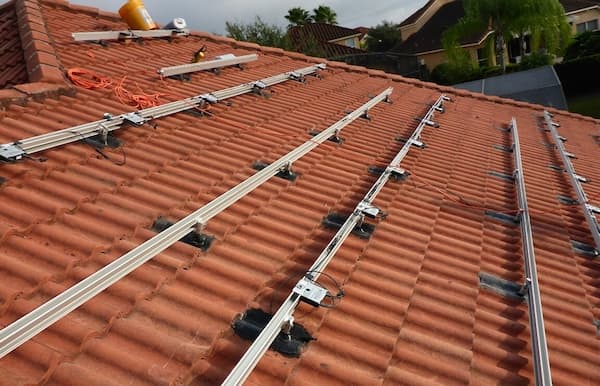
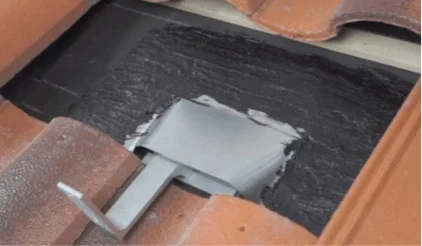
- Slate roofs
- Installing solar on a slate roof is difficult. Many installers do not work on slate because of its fragile composition and the advanced age of most slate roofs. You should be able to find an installer willing to work on slate regardless of your location, but installation will likely be more expensive than for asphalt or tile roofs.

- Flat roofs
- Flat roofs (also called low-slope roofs) are as compatible with solar as pitched roofs. The materials used to cover flat roofs vary widely, and solar can be installed on almost all of them. The three main racking arrangements for flat roofs are parapet-to-parapet wall mounts, ballasted racking, and standing seam clamps. In parapet-to-parapet wall mounts, aluminum beams are attached between the two parapet walls of the home or building. The beams provide a structure where you can lay the panels and clamp them down. In ballasted racking, panels will be connected directly to the roof and tilted upwards at the appropriate angle. In these cases, non-penetrating hardware secures the panels to your roof via weighted blocks. For flat standing seam metal roofs, clamps are used to connect the standing seam of the roof to a series of aluminum rails, on top of which you attach the panels.



Some roofs are not suitable for solar. This can be due to obstructions on the roof (such as dormers, peaks, chimneys, and HVAC vents), the roof’s integrity, shading, orientation, or other structural factors.
If your roof isn’t a good fit for solar, you may be able to install a ground-mounted system. Ground-mounted systems need access to a clearing far away from trees and other objects that cast shadows. Most ground-mounted systems are composed of aluminum and stainless steel racking and are mounted on concrete footings in the ground.
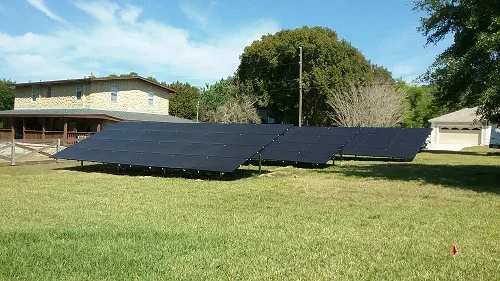
If you cannot produce your own solar electricity on your roof or with a ground-mount, you may be able to purchase solar electricity from a community solar array. Learn more about community solar and see if it’s available where you live.
Most solar arrays are grid-tied, meaning they are connected to the local power grid. This allows solar homeowners to use their solar electricity when the sun is shining, and to seamlessly switch to utility electricity on cloudy days or at night. For grid-tied solar arrays, it’s important to understand how a power outage will affect your solar panels and home.
Firstly, when the power grid goes down, your solar panels will automatically stop producing electricity. This is a required safety feature, designed to prevent panels from feeding electricity onto the grid and injuring the utility linesmen who are servicing the wires. As a result, when the grid is down and your solar panels stop producing electricity, your home will not have power (even if the sun is shining).
If you want your solar panels to continue producing electricity even when the grid goes down, you can pair your solar array with batteries. This pairing (called solar + storage) allows panels to produce electricity while remaining isolated from the grid, avoiding safety issues. Your solar electricity will be stored in the batteries and can be consumed by your home when the grid is down, allowing your home (or a subset of your home’s electrical loads) to remain powered during a grid outage.
How much of your home can you power from batteries when the grid is down? How do your solar panels pair with batteries? For answers to all of these questions (and more!), download our free Battery Storage for Homeowners guide.
Energy payback is the amount of time it takes a solar panel to produce more energy than was used to produce it. The time varies by panel, technology, and the extent to which your energy grid is already powered by renewables. Even as far back as 2004 when manufacturing processes were less efficient, it took less than four years for a standard solar panel to generate more energy than was used to make it. Remember, solar panels can generate electricity for 25 years or longer!
Most solar arrays don’t have batteries. Most residential solar arrays in the United States remain grid-tied, meaning they’re connected to the utility electric grid. Grid-tied solar arrays are significantly less expensive than arrays with batteries. Standalone solar arrays are also more efficient than solar paired with storage. Batteries lose a small amount of their electrical charge as the current moves through them, making battery-paired solar arrays slightly less efficient than standalone solar.
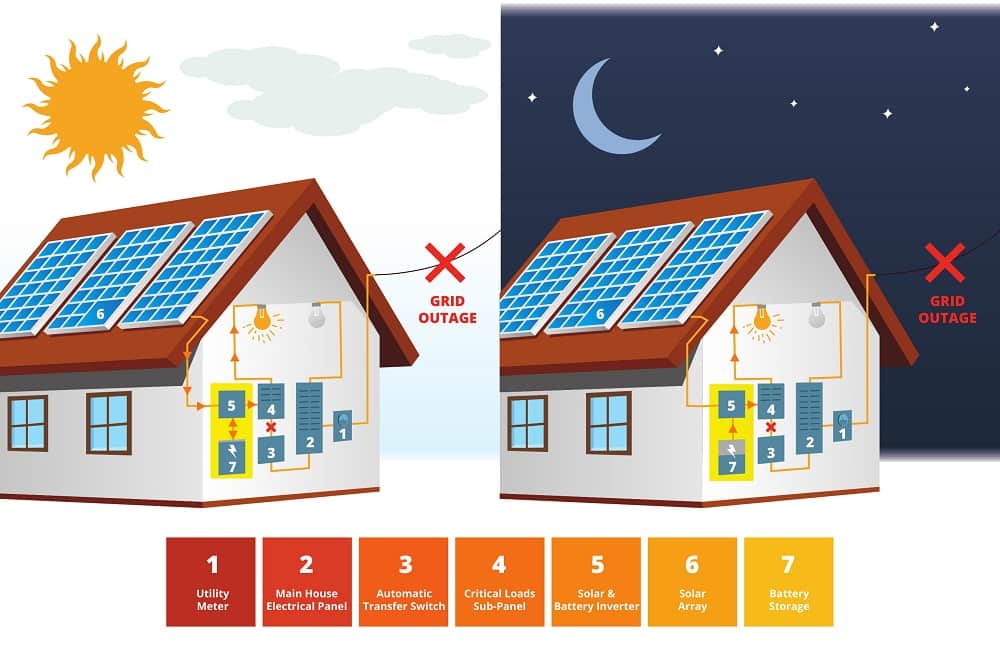
When paired with solar, batteries charge during the day and discharge their energy into the home (powering critical appliances) when the electric grid is out or when there is a financial incentive to do so. This allows you to utilize the electricity your solar panels generate even when the sun isn’t shining.
The primary value of batteries today is for backup power. Pairing your solar array with batteries allows you to power your electrical needs even when the utility grid is down. Luckily, power reliability in the United States is high and grid outages happen relatively infrequently. Regardless, the opportunity to power necessary or desirable electrical loads during grid outages makes battery storage an attractive investment. At present, batteries still come with a premium price tag (see our Battery Storage Guide for Homeowners for pricing information), however many home and business owners are taking the storage leap to access the backup power value batteries can provide them.
As new rate designs and economic opportunities arise that increase the value proposition of battery storage (for example, time of use rates that incentivize customers to store electricity when it’s cheap and use it when utility prices are high), battery economics will change. Solar United Neighbors is tracking these developments and will share them with our network once they become available.
Beyond the economics of battery storage, there are other technical considerations to keep in mind. Batteries take up room in your home, can require maintenance, and will likely need to be replaced at least once during the lifetime of your solar array. Additionally, and most importantly, there are different types of battery chemistries that affect how much energy you can store and draw upon during a grid outage. For more information on how batteries work, download our free Battery Storage for Homeowners guide.
Absolutely! Many home and business owners chose to go solar today — leveraging the immediate cost competitiveness of solar to start saving money on their electric bills — and install batteries in the future, once hardware costs fall.
Nothing prevents you from adding battery storage to an existing solar array — this is called a storage retrofit. There are a few important hardware considerations (including whether to AC- or DC-couple the system, and the most appropriate battery inverter for the desired coupling configuration) and financing considerations for storage retrofits. Learn more in our Battery Storage for Homeowners guide.
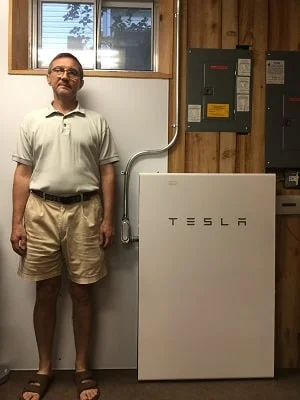
Solar shingles are solar panels that look like regular asphalt or slate shingles. Generally, solar roofs/solar shingles are more expensive than getting a new roof and putting solar panels on it; they can be up to 75% more expensive. The average cost of a 10kW traditional solar system is around $28,600, while the average cost of a 10kW solar roof is around $64,000. Not all installers will install solar shingles.
A typical solar shingle system will not cover an entire roof. Regular shingles that look like the solar shingles you’ve installed will cover the rest.
Solar shingles right now are about 20%-30% less efficient than solar panels because they heat up. Higher temperatures limit energy production because heat reduces voltage. The higher temperatures come from how the shingles are installed. Since they lie on your roof, they don’t have airflow around them. This airflow lowers the solar panels’ temperature since they are slightly raised above the roof. For homes with low electricity usage, sometimes getting to your desired level of electricity bill offset can be difficult with solar shingles.
You should get multiple roofing and solar panel quotes and multiple solar shingle quotes so you can compare. Many solar installers use both solar shingles and regular solar panels, so they can give you a quote on both options as well as roofing services from them or a roofing partner company.
Installing solar
There are four factors that determine if your roof is a good fit for solar:

1. Orientation: Ideally, your roof should face south. In the northern hemisphere, south-facing roofs maximize the amount of sunlight your solar panels collect. The more sunlight they collect, the more electricity they produce, and the quicker you can pay off your system. You can still mount solar panels to your roof if it faces due east or west, but the panels will produce less energy (about 75% of what a south-facing roof would produce). If you have a flat roof, the panels can be engineered to face due south no matter how your roof is oriented.
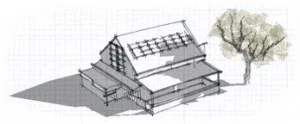
2. Shading: Ensure that your roof is not shaded. The portions of the roof where solar will be installed should be free of shade for most of the day, as shade can significantly reduce electricity production. Trees, chimneys, dormers, and HVAC vents can cause shading on a roof. If you’re not sure your roof is shaded, your installer can use a tool called the solar pathfinder to figure out if trees or other objects will cast shade during the day.
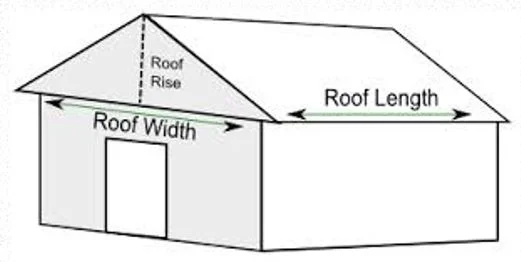
3. Surface: Solar arrays are most efficient when installed in a large, uninterrupted space. Things like dormer windows, chimneys, vents, skylights, and air conditioning units can be obstacles to installing an array.
4. Durability: Finally, if your roof is more than 15 years old, you may want to consider replacing it before installing solar panels. Most solar vendors recommend using roofing material that will last as long as the system (minimum of 25 years).
A solar array will last at least 25 years. The roof underneath it must be in good shape. If your roof is more than 10 years old, you should have it evaluated to determine its remaining lifespan. You may want to consider repairs or replacements before installing solar.
It typically takes one to two months for an installer to design your solar array and secure initial permits (from your municipal government) and interconnection agreements (from your electric utility).

Depending on your solar permitting office and utility interconnection team, this could take anywhere from weeks to months. Once initial permits and interconnection agreements are in hand, your installer will typically need only one to two days to physically install your array (panels, inverter, racking system, and wiring). The installer will then need to get final approval from the municipal permitting office and secure final interconnection approval from the utility. This can take an additional one to three months depending on the jurisdiction.
When choosing an installer, you’ll want to consider many criteria. We suggest you look for:
- Experience: It’s important to assess the installer’s installation experience. How many installations have they completed? How many were systems similar to your own in size, design, and materials? Installers should also be familiar with the permitting and interconnection procedures relevant to your property. How many installations have they completed in your jurisdiction and utility territory?
- Reviews: When researching prospective installers, ask for customer references. How were other peoples’ experiences with the company? Consider checking online reviews at sites like Solar Reviews and the Better Business Bureau.
- Materials: With hundreds of manufacturers and products on the market, it can be hard to know what the best panel, inverter, and racking system is for your property. Ask your installer what components they offer and what their experience has been with those manufacturers. Should you desire a specific type of material (an American-made panel, for example), express that preference upfront with your installer.
- Labor warranty: Labor warranties cover the installer’s workmanship, most likely covering their electrical wiring and roof penetrations. These differ from installer to installer, so it’s important to know what each installer offers when choosing between companies. When researching labor warranties, ask if the warranty covers roof penetrations. Some installers do not offer that coverage under warranty. If having a robust, long-term labor warranty is important to you, ask your installer if they offer an option to upgrade to a longer warranty period.
- Licensing and certifications: While no universal solar license exists, a leading industry certification to look for is NABCEP (North American Board of Certified Energy Practitioners). All installation crews should include at least one person certified as a NABCEP PV Installation Professional (PVIP). This includes electricians. Lastly, request a copy of your installer’s electrical and contracting license. Source: GW Solar Institute
Solar installations come with three warranties: product warranties, power production warranties, and installation warranties.
- Product warranties guarantee the physical integrity of your solar panels and inverters. For example, if a soldered connection on a panel fails (adversely affecting its electricity production), that panel would be replaced under the product warranty. Product warranties are offered through the manufacturer, not your installer. For solar panels, most manufacturers offer a 25-year product warranty. Ten years should be the minimum length of a product warranty.
- Inverters come with product warranties that range from 10 to 25 years.
- Central (or string) inverter manufacturers offer 10- to 15-year product warranties.
- Microinverter manufacturers offer 25-year product warranties.
- Power production warranties guarantee that the solar panel will produce at least 80% of its nameplate capacity for a minimum of 25 years. This warranty is offered by the panel manufacturer. While details vary from manufacturer to manufacturer, the power production warranty assures that your system will continue to produce power over its lifetime. In practice, identifying whether your system is experiencing a drop in performance that violates this warranty is difficult without the assistance of an installer. Despite that, production warranties serve as a proxy for the expected performance degradation of your solar panels over time.
- Labor warranties cover the installer’s workmanship, including their electrical wiring work and any roof penetrations they make to attach your solar array to the roof. This warranty is offered by your installer. Labor warranties vary among installers and regional markets. They typically range from three to 10 years. Some installers offer an option to upgrade to a longer labor warranty.
If you believe your solar system is experiencing problems, directly contact your installer. They can access the data from your inverter to determine if your system is underperforming. Keep in mind that energy production fluctuates from day to day, month to month, and year to year based on weather conditions and other natural factors. Despite these fluctuations, you should see a consistent curve of energy production over time.

If you believe something is wrong with your system, contact your installer and send over any monitoring data you have. In some cases, installers can view the production data themselves, while in others may ask for access to your monitoring system. Either way, they can assess the problem and determine the best course of action using your system data. In extreme cases where the installer needs to dispatch a crew member to fix the problem, ask whether the costs are covered by their labor warranty.
Many states have legislation preventing HOAs from denying members the right to install solar. However, HOAs may still be allowed to restrict how and where solar is installed on your property. Check out state-specific information on HOA solar laws.
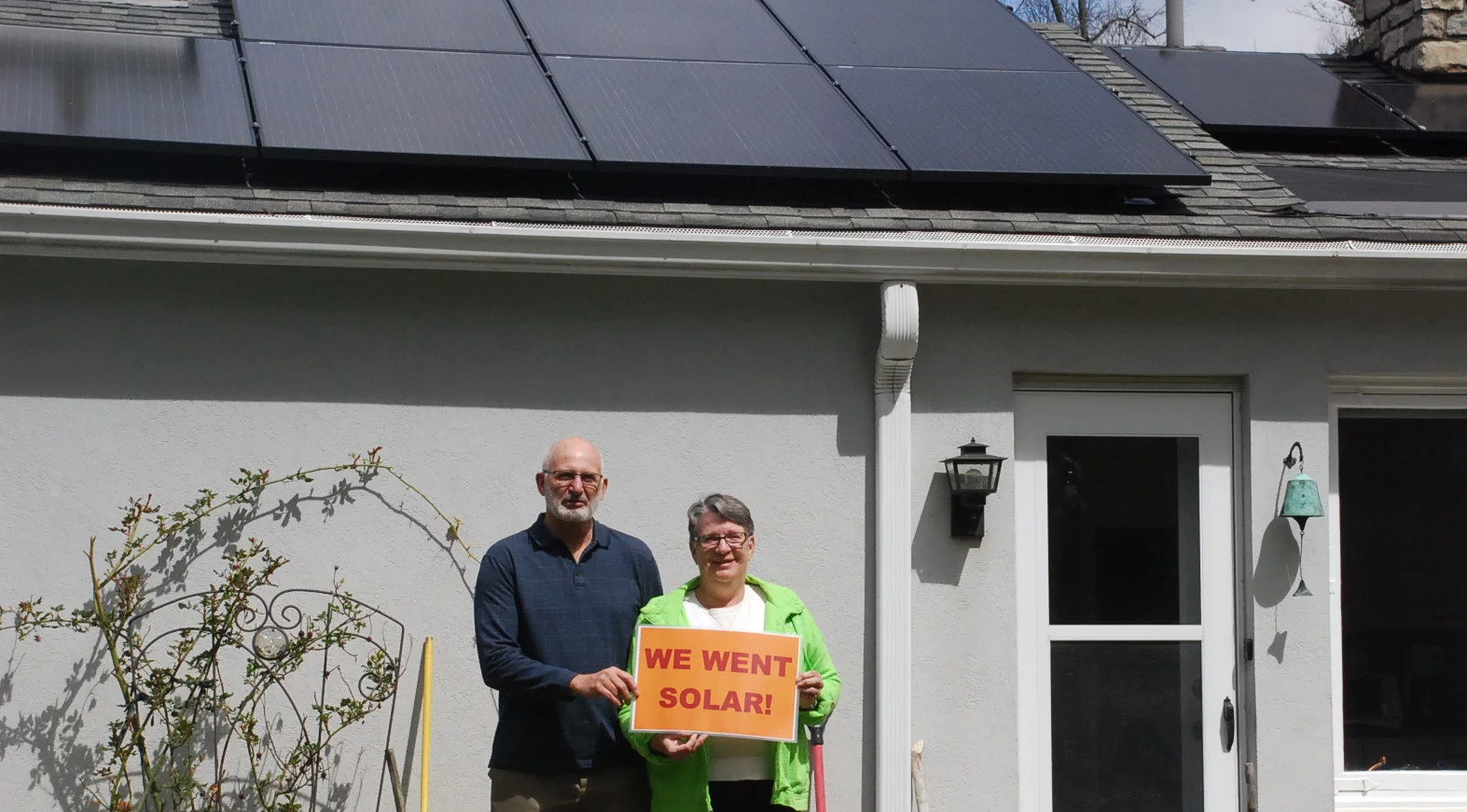
Regardless of HOA solar law, be upfront with your HOA about your solar installation plans. Let them know your installation date and share all relevant information (system size, number of panels, installation timeframe, etc.). Most installers provide a mock-up image of what the array will look like on your roof (or ground) once installed — this can be a compelling resource to share with your HOA.
If you encounter resistance from your HOA, join your state Solar United Neighbors listserv and pose your challenge to the group. You’re likely not alone in facing HOA resistance, and others may be able to share their lessons learned. What’s more, let us know if you encounter HOA push-back. We can help you navigate the process and connect you with solar neighbors who have faced similar difficulties. We have also developed a guide to help homeowners change their HOA’s policies to be more solar-friendly.
Solar installations in historic districts typically must go through an additional step in the permitting process to ensure the location and method of installation comply with local historic requirements (for example, solar panels cannot be visible from the street).
This review is part of the standard permit review process in some areas. In others, it is handled by a separate historical review board. Your installer will be familiar with the requirements in your area. You should expect your installer to work with the relevant review body to secure the necessary permits. The cost for historic district permitting should be included in your solar contract.
Solar permitting is handled by the local municipality, so the permitting process varies based on location. Most localities require installers to file for a solar permit, the stipulations of which differ by jurisdiction. Solar permits are in place to ensure that your system is installed safely and follows local code. From a customer perspective, you should not have to file any local permits yourself. Your installer should handle all permitting, including submitting the permit application and getting the solar system inspected.

It can be more difficult to install solar on these types of homes. The structural design of the home, the foundation of the home, and local building codes can all prevent a solar system from being installed, regardless of structural integrity.
Manufactured homes might not support a solar installation on the roof, which means you could not install panels directly on the home. We recommend having an installer check if the roof can support a solar system. Sometimes they can. Manufactured homes are built according to national HUD building codes, which override state and local codes. For this reason alone, the home may be disqualified for solar depending on local standards for installation. Similarly, local building codes may require a home to have a permanent foundation for a solar installation to occur.
Modular homes may present the same challenges of structural integrity as manufactured homes. However, modular homes are built to state and local codes specific to the location where the home will be placed. If the roof and site can support a solar installation, it may be easier for the system to pass permitting. As with manufactured homes, we recommend having an installer check the roof and site first.

With either type of home, if you find that the roof is not eligible, you may still be able to install a ground-mounted system on your property or a rooftop system on a nearby structure that can support it, like a carport or pergola.
Solar panels work the same way on a mobile vehicle as they would on a home except they are usually not permanently attached to the vehicle or wired into its electrical system. You can buy or make your own portable solar panel system that can be taken down and set up or use small or flexible panels that can be roof mounted. A mobile solar system setup makes sense for owners who do lots of “boondocking” without a nearby power source. However, solar may not make sense if you are primarily at campgrounds with electric hookups nearby.
RV solar systems are much smaller than residential solar systems and are designed to provide enough power to recharge electronics or run kitchen appliances. A solar panel setup can be a cost-effective and green way to use electricity on the go as solar panels require little or no maintenance.
To use solar power for a van, RV, or camper, your system will need solar panels, a battery for storage, an inverter to run AC appliances, and a charge controller to avoid overcharging your battery storage system. There are many off-the-rack mobile solar systems that you can buy from camping stores and retailers. While most solar installers won’t work on a mobile system, there are companies that specialize in this type of installation if you prefer to have a system that is permanently connected.
To learn more about this type of system or connect with other solar RV/van enthusiasts, there are multiple Facebook groups and many Reddit posts devoted to mobile solar systems.
A report by the National Renewable Energy Laboratory (NREL) found that most rooftop solar systems should be covered as part of your standard homeowner’s insurance policy. Contact your insurance company before you install your system to let them know about the addition to your property. You should verify that solar system replacement costs don’t exceed your current policy coverage limits in the event of damage.
Adding solar should not increase your homeowner’s insurance premiums, or affect coverage from an existing provider. If it does, you may need to find a new insurer, or search for one that provides discounts to customers who “go green”. You should also be aware that some states require additional liability coverage for larger solar systems, the size threshold of which will vary by local rules. The NREL report notes that ground-based solar systems may not be covered and may require additional insurance.

Generally, installing solar does not automatically void your roof warranty. Roofing warranties usually cover workmanship and manufacturer issues. Your warranty may be voided if there is damage caused by external factors such as an improper solar installation
Understanding the two main types of roof warranties:
- Manufacturer/Product Warranty
- Covers defects in roofing materials (shingles, tiles, metal)
- Duration: can range from 10-20 years for asphalt shingle roofs and up to 50 years for metal roofs
- Workmanship/Labor Warranty
- Covers installation errors or poor workmanship
- Duration: can range from 1-10 years
Installing solar can potentially void your warranty if it causes damage to the roof. To avoid these issues, make sure your solar installer is qualified and familiar with proper mounting techniques, flashing installation, and other procedures to minimize the risk of damage. Also, be sure the installer follows the roofing manufacturer’s instructions. Some roofing manufacturers have specific guidelines for solar panel installations.
In some cases, installing solar panels may not be covered under the roofing warranty, so it is a good idea to check with both your roofing and solar installers to understand how the warranties interact with one another.
Solar economics
Even before you install solar, reading your electric bill can be confusing. There are multiple charges and line items listed. Check out this guide explaining the different components of your bill and how to identify them each month.
Once you install solar, your monthly bill will look slightly different. Most notably, the bill will newly include “outbound energy,” or the solar electricity (kWh) exported to the grid when it isn’t needed at home. It’s important to be able to read your bill to verify that your utility company is accurately crediting you for your solar electricity. Click here for guidance on how to read your electric bill after going solar.
Typically, you are compensated for your solar production by net metering. Net metering – also known as Net Energy Metering, or NEM – allows solar homeowners to offset energy consumption with their energy production. When your solar panels produce more electricity than you use, the excess electricity is sent out to the local grid. When this happens, your electric meter runs backwards, crediting you for this contribution. When you’re using more electricity than your system is generating, your electric meter runs forward, pulling the necessary extra electricity from the grid.
At the end of the month, your final electric utility bill is your total usage minus the electricity your solar panels produced. For more information, read our guide on net metering.
While net metering is the primary policy that enables solar producers to be compensated, some states’ policies vary. In some markets, solar homeowners are credited for exporting electricity at a lower rate than they pay to import electricity. To check the policy in your state, see DSIRE’s (Database of State Incentives for Renewables & Efficiency) solar incentive database or ask your installer.
It is common for systems to produce more energy than a home consumes. This can happen during the day when no one is home. When this occurs, it will be reflected on your monthly electric bill. Excess electricity (kWh) produced by your solar system will first be applied to any electricity consumed from the grid. The remaining credits are carried over to the next month’s bill.

It is uncommon for systems to be sized to produce more energy than you consume over a year. If you produce more energy than you consume on an annual basis, you will be compensated depending on the state policies in place. We do not recommend installing a system that will produce more than 100% of your energy consumption, because you are often compensated for the excess electricity at a lower wholesale rate.
Several factors dictate the price of your system, not just the cost of the panels themselves. Other factors include the price of the inverter and racking equipment, engineering time, design, labor, and permitting. Many of these components are soft costs that are not based on the price of physical equipment. Solar United Neighbors aims to reduce these costs so home and business owners can see more savings when going solar.
According to the Solar Energy Industries Association (SEIA) and Greentech Media Research (GTM), the average price for a residential solar installation is around $3.00/watt. That means the cost of a medium-sized residential system of 5 kW, is around $15,000. This does not factor in any additional incentives.
Several factors impact the cost of a solar system. These include the size of your system and the equipment you use. Local factors also influence the cost of solar, including permitting costs and the local cost of labor.
Your installer will be able to walk you through several options depending on your budget and preferences. If you chose to finance your system, you may owe very little upfront and see savings right away.
When thinking about financing, it is important to consider the two ownership structures available when going solar:
- Direct ownership means you own your system outright and are eligible for all available incentives.
- Third-party ownership means another entity owns and operates the system.
Each offers benefits. Which model is right for you will depend on individual preference.
Owning a system outright means you purchase the system upfront. This can be done through a loan or with an upfront cash payment. Owning a system means you retain the rights to the system’s additional incentives. Direct ownership of a system makes sense if you can pay for the system upfront or are able to take out a loan.
If you plan to sell your home shortly after going solar, it may make sense to purchase the system. Owning the system outright makes it easy to transfer ownership of the panels to the new homeowners and to incorporate their price into the value of your home. Selling your home after going with a third-party ownership model is more complicated because you’ll need to pay off the remainder of the lease or PPA, effectively purchasing the system. If you don’t wish to pay off the system, the new homeowners will have to agree to take over your current contract and pay off the remainder of the agreement themselves.

Financing a system you own: Modern financing mechanisms have made solar more affordable and available. When going solar there are several ways to finance a system you own, including loans, Property Assessed Clean Energy programs, and other incentives.
Standard solar loan products are available nationally and directly from banks and individual solar finance companies. You do not need any type of collateral to get an unsecured solar loan. You can choose from many loan products ranging from one to 20 years in length. In most cases, these loans do not penalize prepayment. New solar loan products are coming on to the market regularly and may be available directly through your installer.
Click here to learn about financing options that may be available to you.
Secured loans require some sort of asset as collateral. The most attractive loan often is a home equity line of credit leveraging the value of your home with the installation of a clean energy system. The interest rates on home equity lines of credit are often very low and the interest paid on them is usually tax-deductible. You can get secured solar loans from a number of banks and credit unions across the nation.
Click here to learn about financing options that may be available to you.
A promising financing method when it comes to solar is Property Assessed Clean Energy (PACE). PACE programs connect building owners with long-term, no-money-down financing for energy upgrades, including solar installations. Under PACE, you repay the project financing over time through an additional charge on your annual property tax.
The PACE program administrator works with your municipality to calculate the additional annual property tax so that it is less than the annual savings from your energy upgrade, making PACE financing cashflow-positive from day one. Unfortunately, PACE is not available in all markets. PACE financing must be enabled through state legislation and enacted by your local government. View a list of active PACE programs here.
Click here to learn about financing options that may be available to you.
Third-party ownership means that a solar company will own and maintain the panels installed on your roof, as well as provide insurance and maintenance for the lifetime of the agreement, normally 25 years.
As the homeowner, you simply purchase the energy the panels produce through a power purchase agreement (PPA) or pay a fixed, monthly rate (lease). PPAs and leases are like other financing instruments, and generally feature no upfront fees. Typically, the price of solar is lower than the cost of standard electricity, so you can benefit from monthly savings. A lease or PPA contract typically runs 15 to 25 years, and may include an option for the homeowner to purchase the system outright later in the contract term. In this third-party ownership model, the company that owns the system will retain the federal tax credit and any other available local incentives and share some of that related savings with the customer.
The residential solar tax credit expired at the end of 2025. If buying a system outright or through loan financing, homeowners will no longer be able to qualify for the credit. However, third party ownership models (solar leases and power purchase agreements) qualify under the commercial tax credit. This is still in effect through 2029. In these cases, the system owner would be eligible for the federal tax credit as long as certain requirements are met. Your solar installer will be able to let you know if your system qualifies.
What are the benefits of power purchase agreements and leases?
- The third-party owner is responsible for repairing or replacing any system components (solar panels, batteries, inverters, etc.) that fail.
- The third-party owner of the system carries insurance that replaces the system if it’s damaged due to a natural disaster.
- Third-party ownership models allow individuals and organizations to go solar without any money paid up-front.
- The third-party owner is responsible for maintaining the system for the length of the contract.
- If the homeowner cannot take advantage of federal or state tax credits or other incentives, the third-party owner company takes the incentives and pas some of the incentive-related savings on to the customer, incorporated into the monthly fee.
Considerations for power purchase agreements and leases:
- As with any legal document, it’s important to understand key elements and fine print of the agreement before signing it. PPAs and leases have contractual terms of up to 25 years and the homeowner may have responsibilities during that time such as making sure the system stays free from shade.
- Since the third-party owns the system, the individual or business will not be able to directly take advantage of any incentives like the federal tax credit, Solar Renewable Energy Credits (SRECs), or grants.
- Some PPAs may increase the price you pay for the electricity your system produces over the life of the contract. This is known as an escalation rate, or escalator, for short. Escalator rates can vary by contract and provider.
- Third-party ownership is only available in certain states.
Questions to ask about leases and power purchase agreements:
- Does the agreement include all the relevant components of the SEIA Transaction Disclosures? (SEIA is the national solar industry association)
- What is the term of the agreement?
- What is the cost of energy ($/kWh) in the agreement or the monthly payment?
- What assumption does the proposal use to project how much my utility electricity costs will go up over time? (The assumption is usually based on 10- or 20-year historic information but can vary by provider and even by proposal. The higher the assumed rate of increase, the better the economics will look in the proposal.)
- Is there an escalator for my monthly payments? In other words, will my monthly payment for the PPA go up during the life of the agreement? If so, by how much and how often? If payment goes up over time, the cost of electricity from your utility must go up at a higher rate than your solar payment for you to save money with the solar system.
- What are my options if I decide to sell my house before the agreement ends? Options typically include: the new owner assumes the contract, you buy out the contract, or the company moves your system to your new home if you are moving nearby and the new home is a good fit for solar.
- What are my options when the agreement ends? Options typically include purchase the system at fair market value, extend the life of your PPA or lease, or have the installer remove the panels from the roof.
- How long are roof penetrations warrantied? [Why this is important: because an installation warranty describes how long an installer’s work is covered against problems encountered due to the act of installing components on the home (e.g., roof leaks). You should determine if your agreement covers that for the entire term or for a shorter period.]
- Will there be a cost to remove and replace the panels [and what is it] if I need a new roof or a roof repair in the future
- Will system components be covered for the life of the term or just for the manufacturer’s warranty length? What additional costs apply if equipment should fail after warranties expire? The industry standard is to cover all maintenance and repairs during the life of the agreement. [Why this is important: because equipment warranties can range from 10 to 25 years. If you have a 20-year term on your agreement but the inverter (for example) is covered for 10 years, what happens in year 11 if it fails? Do you incur additional charges?]
- Is additional insurance coverage provided by the company as part of the agreement?
- Will I still pay monthly for my leased system if the system stops functioning? [Why this is important: if your system has an error and stops producing electricity for a time, you won’t be saving on utility electricity costs during that period. For short periods, that’s okay. For longer periods, you may still be making monthly payments to the company but not receiving the electricity savings benefits.]
- If your system has a battery, how will you benefit, besides continued power during outages? Does the system owner use that battery to provide services to the grid? What percentage of your battery storage will be retained for your use? What compensation will customer receive for services provided by battery to the grid?
You have many different options to secure a loan for your system. You may be able to get a loan from your bank or credit union. The federal government has several loan programs to help you go solar.
Available incentives
- Solar Renewable Energy Credits (SRECs). In some states, when you generate solar electricity from your system, you also generate an associated “green value” for your electricity. This is known as an SREC. Every time your system produces 1,000 kWh, or 1 MWh, of electricity, you get one SREC. These SRECs have a variable monetary value, like a company’s stock or commodity product, and when sold on the open SREC market, can give you a revenue stream to help pay for your solar system. SREC prices are dictated by supply and demand of solar energy production and legislation called Renewable Portfolio Standards (RPS). Learn more about SRECs.
- USDA REAP (Rural Energy for America Program). REAP offers grants and loans to agricultural producers and small businesses in rural areas to install renewable energy systems. It also provides funding for energy efficiency improvements. Learn more about the REAP program.
- Additional Local Incentives. Several states and municipalities have developed additional incentives for those interested in installing solar: additional state tax or property tax credits, grants, rebates, and financing programs.
For a comprehensive look at the incentives available in your state, see our state guides.
It depends upon your system’s ownership structure. The appraisal industry is training its workforce to accommodate the growth of solar nationwide. The Appraisal Institute now trains real estate appraisers to assess the value solar and other energy efficiency measures add to a home. Make sure to request a real estate professional who is properly trained in evaluating the impact of solar during an appraisal.
If you own the system, it can convey with your home and help boost its resale value. A 2015 study by Lawrence Berkeley National Laboratory found that, on average, a typically sized residential solar system adds $15,000 to the resale value of a home. The study completed an analysis of more than 22,000 home sales across eight states — nearly 4,000 of which had PV systems. The home sale data spanned 2002 to 2013. A 2019 Zillow study found solar increased home values by about 4%.
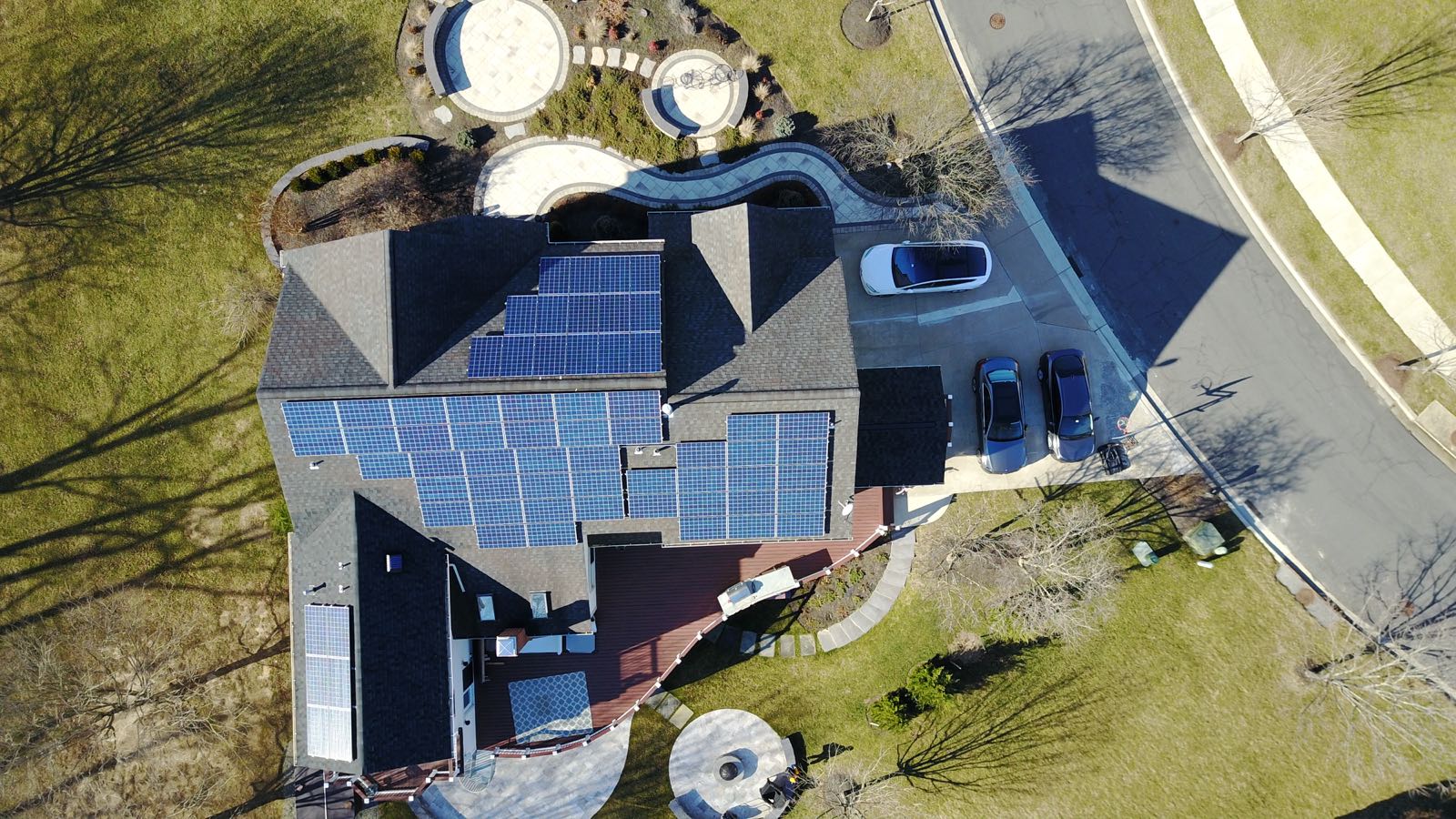
If you lease the system, you may have options depending on your lease agreement. It may be possible to transfer your lease as part of the home sale. Or you may have to pay off your lease before selling your home. You can then include the cost of this pay-off in your home’s sale price.
It’s important to make sure your home’s value includes the value of its solar installation. If you are a licensed real estate appraiser and want to learn how to assess the value of solar in your appraisals, read more about the Appraisal Institute’s Valuation of Sustainable Buildings development program.
For more information, check out our Selling Your Solar Home Guide.
Solar co-op basics
A solar co-op is a group of homeowners in a defined geographic area (usually within a county or multiple adjacent counties) who use their combined purchasing power to ensure they receive a highly competitive solar installation. Solar installers face significant costs finding, qualifying, and educating solar customers.
When forming a group of interested buyers, co-op members can secure competitive pricing because Solar United Neighbors has already done some of the work for the installer. Additionally, installers are incentivized to provide great value on their installations through quality equipment offerings, extended system warranties, and more.
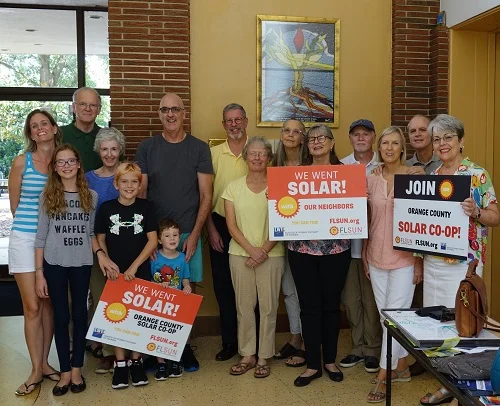
Co-op members have access to our installer-neutral and unbiased staff of solar experts to guide them through the installation process and understand topics like the value of their solar, local policies, and financing options. Solar United Neighbors provides educational resources, public information sessions (many of them online), and one-on-one support for all co-op members. All of our members can join the growing movement of solar owners and are keyed into important issues and updates in solar.
Our unique co-op process helps ensure co-op members get a quality install from a neutrally selected installer that has been reviewed by Solar United Neighbors. What’s more, it costs nothing to join the group! We issue a request for proposals on behalf of each solar co-op to procure competitive bids from local installers. We then help the co-op form a selection committee to review each bid so they can select which one is best for the group.
Solar United Neighbors is installer-neutral, leaving the installer selection to co-op members. We provide support by ensuring each selection committee member understands all of the components of the bids and can make a fully informed decision. The winning installer will then offer the same pricing, equipment, warranties, and any additional components from their bid to all co-op members.
We work closely with co-op members once the installer is chosen to evaluate their solar proposals and contracts to help in their decision on going solar. Joining the co-op is not a commitment to sign a contract and install solar — that choice is up to the homeowner. If they decide to move forward, we advocate on their behalf during the installation process. We can provide one-on-one support to any member who needs additional help and ensure they have everything they need before going solar.
Once the installer has finished every solar installation, we throw a big party to celebrate the success of the co-op and recognize everyone who helped along the way. The support of our installers, partners, co-op members, and local leaders makes our co-ops possible.
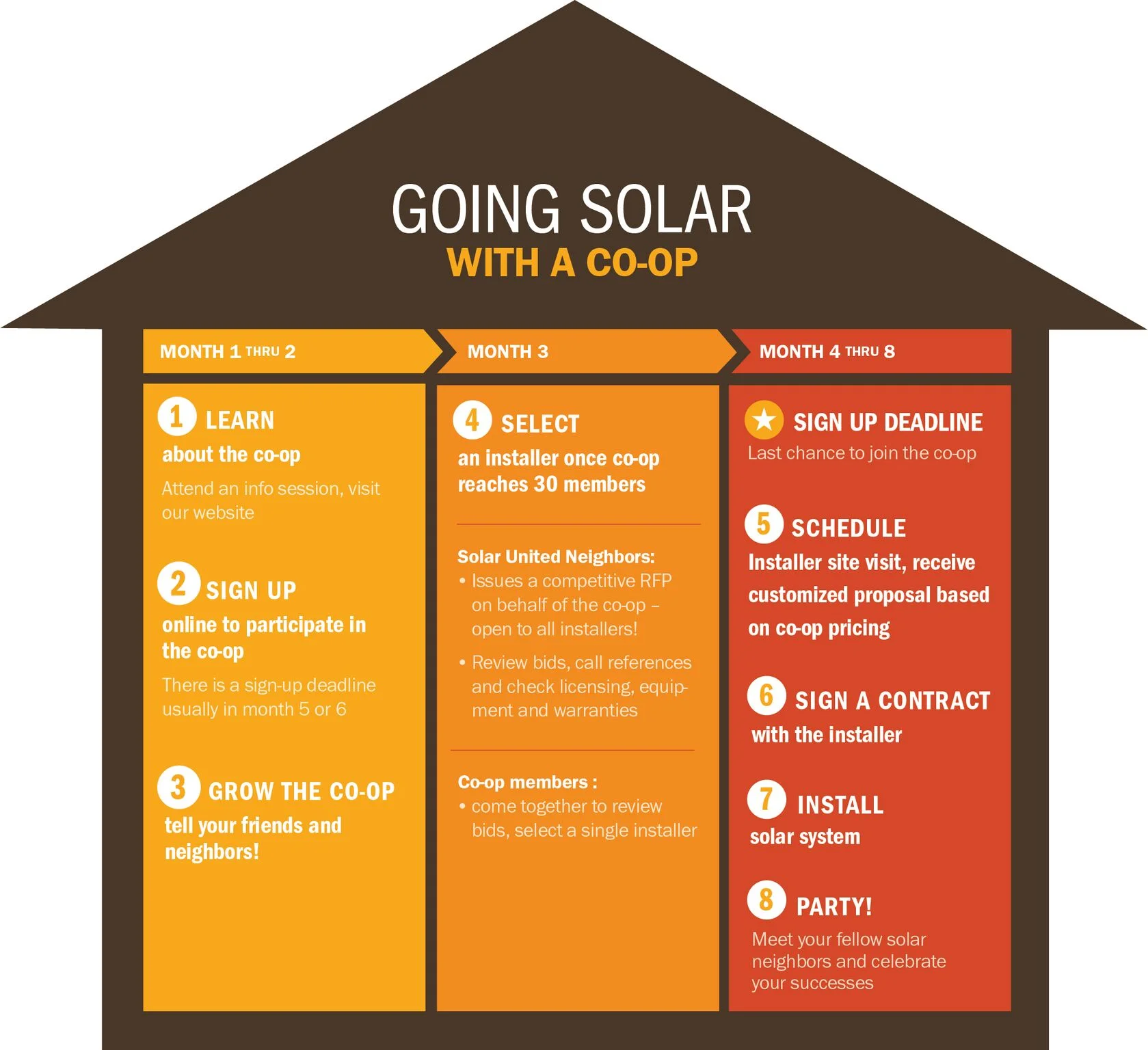
Storage Economics
There are several things that go into pricing out a battery storage system:
- Soft costs – installation, permitting, system design, labor
- Hardware costs – battery equipment, inverter, other electrical components
- Maintenance – visits from a qualified professional to ensure your system is operating properly.
The cost of battery storage priced by an installer will include soft costs and hardware costs and can range widely from $7,000 to $20,000 because it is customized to the amount of energy a homeowner wants to power loads in their home during an outage.
The residential solar and battery storage tax credit expired at the end of 2025. If buying a system outright or through loan financing, homeowners will no longer be able to qualify for the credit. However, third party ownership models (solar leases and power purchase agreements) qualify under the commercial tax credit. This is still in effect through 2029. In these cases, the system owner would be eligible for the federal tax credit as long as certain requirements are met. Your solar installer will be able to let you know if your system qualifies.
Some states and jurisdictions are also beginning to offer incentives. Maryland, for example, offers a 30% state tax credit off of the cost of battery storage with a maximum credit of $5,000 for residential systems.
In areas across the country installing battery storage will not result in a profit because the electricity rate structures do not incentivize the storage of energy in the home. For most homeowners, battery storage is about backup power and being resilient.
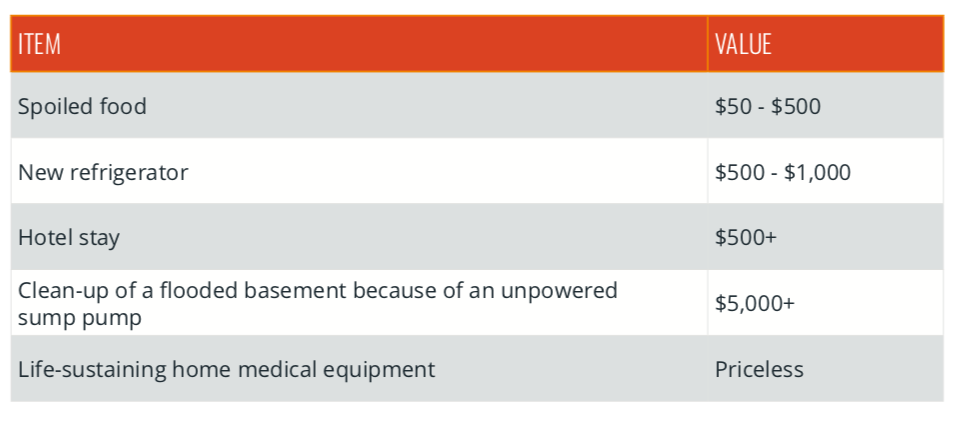
Learn more about battery storage and its potential value in the future with our Battery Storage Guide.
Unlike solar, with its numerous loan financing options, there are limited financing options available for storage. Typical options like home improvement loans and home equity lines of credit are available. Some solar loan providers, like Mosaic, offer financing for storage as well. If you have PACE (Property Assessed Clean Energy) financing available in your area, this may also be available for storage.
In some areas third-party owned systems may be available. Under these arrangements you can use the battery system for backup power and the battery owner uses it to provide grid services to the utility. This kind of arrangement is new and not yet widely available. Ask your installer about financing options they can offer from the manufacturer or from third-party financiers and compare them to what you can acquire on your own.
Solar & Electric Vehicle (EV) Charging
Battery Electric vehicles (BEV’s) use electricity to power their motors. The electricity is stored inside a battery, which is recharged by plugging into an EV charger.
Download our free EV Charging Guide for in-depth information.
- Level 1 chargers
- Standard level 1 EV charger uses a 120v outlet.
- Charger plugs into a standard household 120-volt electric outlet, and are the slowest and least powerful EV charger.
- Provides about four to six miles of charge per hour and are typically used for overnight charging, for EVs with smaller batteries, or when installing a more powerful charger is not possible.
- Level 2 chargers
- Level 2 chargers are the most commonly-used EV charger. They provide about 10 to 30 miles of charge per hour (depending on the type of vehicle and power of the charging unit).
- Requires installation by a professional electrician.
- Utilizes a 240-volt plug identical to a household clothes dryer, which can be installed in a garage, on the side of buildings, or on pedestal mounts in parking lots for businesses.
- Charges three to six times faster than a level 1 charger.
- The cost of charging equipment can range from $500-$750 plus the cost of installation (typically between $500-$1,000).
With their relatively low cost and ease of installation, level 2 chargers are a great option for those interested in a faster charge. If you have a long commute, an EV with a large battery, or simply want faster charging at home, a level 2 charger is a great solution.
- Level 3 DC fast chargers
- DC fast chargers can deliver more than 100 miles per hour of charge.
- Although much faster than level 1 and 2 chargers, they require costly, robust electric infrastructure for their installation and use, and are primarily used for public charging along transportation corridors.
- They are the least commonly-used chargers for homes or businesses.
Nearly all level 2 chargers are equipped with the J 1772 or “universal” charging port that accommodates all major EV makes, with the exception of Tesla. Tesla vehicles have their own type of charging port, but also have an inexpensive adapter that can be used with standard universal charging ports.
This largely depends on battery size and what type of charger you are using. The smallest plug-in hybrid batteries have a range of about 11 miles per charge and the largest fully electric batteries can go 370 miles between charges.
- A level 1 charger runs on 120V and charges 4-6 miles per hour.
- A level 2 charger runs on 240V and charger 10-30 miles per hour.
- A level 3 fast charger is usually used at public facilities such as rest areas and can charge 80 miles per hour.
For a Chrysler Pacifica plug-in hybrid which can run 33 miles on its battery, you could fully charge the battery to with a level 1 charger in 5-6 hours. A level 2 charger can charge the same battery in 1 to 1.5 hours.
For a Tesla model 3 standard range, which can go 250 miles on a charge, you could charge the battery to 80% with a level 2 charger in 6 hours or with a level 3 fast charger in 1 hour.
Of note, car models and chargers have different charging capabilities. Also, batteries charge in different ways, therefore it can be faster to charge a battery from 40% to 80% than from 80% to 100%.
It is important to talk to your electrician or installer about the type of EV that you have and the power capabilities of your home. All level 2 chargers run 240V electricity but older EVs and EV chargers (pre 2017) aren’t as powerful as newer models. Some chargers are hardwired directly into the house while others are connected to a 240V outlet and some are connected to your solar inverter.
Your EV charger should be compatible with your EV (Tesla vs. universal EV plug) and should have a long enough cord that it can reach your vehicle without creating a tripping hazard. Length of warranty is an important factor for many buyers as well when purchasing a level 2 charger.
A level 2 EV charger runs on 240V electricity and an electrician or solar installer can install a 240V outlet and a level 2 charger. An electrician can tell you if you need a wiring upgrade to your electrical system. Mmost homes do not need an upgrade.
An EV charger can be installed in a garage or on a freestanding pedestal in front of a home, or next to a driveway. Chargers are small and don’t take up much space, but do have a cord that must be connected to your power supply.
Many websites and apps can help you plan a road trip and find EV charging stations on the road. Some include:
- Tesla’s Go Anywhere with trip planning information for Tesla vehicles in mind.
- PlugShare
- ChargeHub
- A Better Routeplanner
Click here to read our guide to sizing solar for your electric vehicle.
In general, without accounting for your household electricity usage, the following estimates can help calculate how the size solar array you may need to power your EV:
- 3,500 miles driven annually = 1 kW of solar capacity needed
- 7,000 miles driven annually = 2 kW of solar capacity needed
- 10,500 miles driven annually = 3 kW of solar capacity needed
- 14,000 miles driven annually = 4 kW of solar capacity needed
- 17,500 miles driven annually = 5 kW of solar capacity needed
- 21,000 miles driven annually = 6 kW of solar capacity needed
Data shows that EV’s cost 50% less to maintain and fuel over their lifetime compared to gas-powered vehicles.
At Solar United Neighbors, we envision a world where everyone who goes solar can use it to charge their electric vehicle. Regardless of how you charge an EV, electric vehicle owners save money in the long run compared to owning a gas-powered car. This doesn’t even factor in how EVs need fewer car repairs and brake jobs due to regenerative braking.
As an example:
- A 2020 Standard Range Tesla Model 3 uses 24 kilowatt hours to go 100 miles. Using a national average of .16 cents per kWh, that means that this electric vehicle costs $3.84 in electricity to go 100 miles or $460.80.20 to go 12,000 miles (the national average for what most drivers drive annually).
- A gas-powered car using the national average of $3.64 per gallon and 25 miles per gallon, would cost $14.56 in gasoline for 100 miles or $1,747.20 annually to go 12,000 miles.
While based on average numbers, this example shows that driving an EV can save $800 to $1,400 annually compared to a gas-powered car.
Yes. There is a 30% federal tax credit for the purchase and installation of an EV charger. This credit is available until the end of 2025. There is a $1,000 limit on the credit. It is unlikely that you would reach this cap with the type of charger you would install at your home.
Many states, municipalities, and utilities also provide tax credits and rebates. You can find a list here. Make sure you research. Some incentives are only available if your EV charger is publicly available on the street, or in a shared parking lot.
The average cost of an EV charger is $500-$750 and the average installation cost is $500-$1000. Prices vary and are often cheaper if you buy your EV charger from the installer directly versus buying it on your own and having the installer put it in for you.
The price of the charger depends on quality and also on the size, cord length, capacity and product warranty. Pricing of the installation depends on where it will be installed such as outdoor vs. indoor and how much electrical conduit will need to be run from the electrical panel to the outlet that the charger is plugged into.
For solar owners, the idea of fueling your car with homegrown energy is especially compelling. Depending on where you live and your electricity consumption, many solar owners choose to add solar systems to power their electric vehicles in addition to their houses.
Electric vehicles are quickly becoming a more affordable and a lower maintenance option compared to gasoline-fueled cars. America’s EV adoption rate is quickly rising as more affordable, long-range models are introduced to the market.
Market studies show that roughly half of consumers who have solar or EV technology have both. Similarly, consumers who are interested in one of these technologies are also interested in the other. Utility planners who forecast how much electricity to provide the grid (i.e. load) will need to consider these findings as technology adoption ramps up.
Solar United Neighbors runs Solar Co-ops and Solar + EV Charger Co-ops. In most of our co-ops, the solar installer that the co-op members choose can also install Level 2 Electric Vehicle Chargers for those who want them. Higher speed Electric Vehicle chargers can be installed at the same time as a solar PV system or separately from solar.
There are many different types of EV chargers available. Some are standalone and others work directly as part of a solar inverter. Many homeowners choose to install an EV charger while they’re installing a solar system. Others choose to install an EV charger or solar system first and the other separately.
While Solar United Neighbors focuses on solar, there are many solar supporters who can’t get solar on their own rooftop. This is why we also work on Community solar, which offers the benefit of solar to those who can’t, or prefer not to, install solar panels on their homes. These projects enable individuals, businesses, or organizations to purchase or subscribe to a “share” in a community solar project. If you join a community solar project, you receive a monthly credit on your electric for the energy produced by your share. Many people who participate in Community solar own a vehicle, but not a residence, and may purchase electricity from a Community solar installation to help power their residence or EV.
Even if you cannot take advantage of Community solar in your area, owning an EV has many benefits including less frequent maintenance, savings from electricity generally being cheaper than purchasing gasoline, and fewer or no trips to the gas station.
Also many types of EVs have large tax credits. If you are interested in an EV to reduce carbon emissions, use this tool to plug in your your zip code and the different sources of electricity production in your area to find out how much you are reducing your carbon footprint by driving an EV or hybrid versus a gas powered vehicle.
There are many different types of EVs available in the United States. Battery Electric vehicles (BEVs) and Plug-in Hybrid Electric Vehicles (PHEVs) are available from almost every major automaker and range from small sedans to larger Sport Utility Vehicles and Minivans. Many plug-in hybrid vehicles run on batteries for the first 10-50 miles of driving and fully electric vehicles can vary in mileage from 87 miles per full battery charge to more than 350 miles per charge.
Find answers to your specific solar questions.
Our Solar Help Desk is here to provide the personalized resources to help you make the decision that’s right for you, your home, and your future.
Storage Technology
Storing electricity in a battery bank can serve many purposes. In most parts of the country, battery storage for residential homeowners is mainly used to provide backup power during power outages.
When the utility grid goes down and you lose electric service, a battery system can power some or all of your household electricity needs (called loads).
A battery backup system works by isolating certain loads from the main utility system with something called an automatic transfer switch. You can then power these loads with electricity stored in the battery bank. Loads can range from small (light bulbs, a toaster, or hair dryer) to large (a refrigerator or a well pump). When the utility grid power returns, the backed-up loads in your home automatically reconnects to the grid. The result is that these critical loads receive power, even when the grid is down, switching seamlessly between utility electricity and stored electricity from your battery.
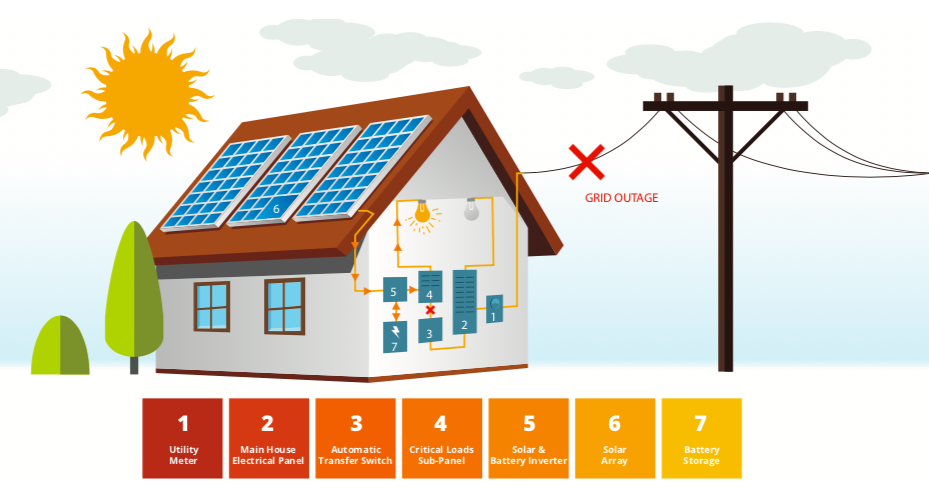
Battery banks in a home serve the same purpose as a traditional generator that runs on diesel, gasoline, propane, or natural gas. Unlike a traditional generator, a battery backup system does not require you to buy and store fuel or rely on fuel delivery during an outage. When paired with a solar array, the battery is charged with the solar electricity you produce. If you do not pair your batteries with solar, the battery will charge and recharge only from utility-supplied grid electricity. This limits its usefulness for backup power purposes during a utility outage as it will only be able to discharge once before needing the utility grid to be restored for it to recharge.
Powering your entire home with a battery system can get expensive. This is why many homeowners install a smaller battery bank to power select critical loads, such as medical equipment or a refrigerator, in their home during the event of a grid outage.
If you feel strongly about powering your entire home during an outage, ask your installer for pricing and compare it with a whole-house fossil fuel-powered generator that may be more cost effective.
There are different types of batteries that can provide battery backup power to your home. Different battery types have different chemistries:
- Lead acid batteries
Lead acid batteries have been around a long time but are being used less and less as costs for other, more energy-dense battery chemistries continue to drop. They’ve powered cars, tractors, and submarines, and have been used to provide backup power to homes and buildings.
The most common variety of lead acid batteries for backup power is called sealed lead acid. These types of lead acid batteries do not require regular maintenance to keep them operational, unlike their flooded lead acid cousins. Lead acid batteries have a lower upfront cost than newer lithium-ion batteries. They also take up more space than newer options. Depending on how often they are used (or cycled), they can last five to 10 years.
- Lithium-ion batteries
The market for lithium-ion batteries is growing rapidly and prices are dropping. The technology offers a higher density of energy (more energy per unit of space) than traditional lead acid batteries and can be used (or cycled) more often during their lifespan. The upfront cost of lithium-ion batteries is higher than that of lead acid batteries. However, because of their longer lifespan (about 10 years) and their ability to be frequentlycharged, lithium-ion batteries have a lower lifetime cost than lead acid batteries.
Two types of lithium-ion batteries:
- Lithium Nickel Manganese Cobalt Oxide (or Li-ion-NMC) is the commonly available lithium-ion battery type and is the least expensive lithium-ion battery on the market. These batteries can overheat and catch fire in rare cases of overcharging or improper use (known as thermal runaway). You may have heard of this phenomenon with cell phones, e-cigarettes, hoverboards, and other small consumer devices. However, home battery storage systems include sophisticated management software that is designed to prevent overcharging and thermal runaway problems. To date, there have been no reports of home storage systems catching fire.
- Lithium Iron Phosphate (or LiFePO) is more expensive than the Li-ion-NMC variety. It does not experience thermal runaway or contain cobalt, whose mining practices, especially in the Congo, have recently come under scrutiny.
While used interchangeably, these terms define two different parts of our electricity system.
- Energy is what the electrical loads in your home consume over time in order to operate. It’s the total amount of (electrical) work that can be done, and it’s what we pay for every month on our electric bills. It is measured in Watt-hours (Wh). A thousand watt-hours equals one kilowatt-hour (kWh).
- Power is instantaneous and measured in watts (W). One thousand watts equals one kilowatt (kW). It’s the ability to do (electrical) work in a given moment. For example, if you took a cup of water and placed it in a 1000-watt microwave for two minutes it would be just as hot as if you’d placed it in a 2000-watt microwave for one minute. Each time, you used the same amount of energy (kWh) to heat the water.
The size of the battery bank you need depends on several factors and is specific to your needs and home. A qualified energy installer should evaluate the below factors to determine what you need:
- What kinds of loads you would like to run while the power is out.
Your installer should look at which appliances, lighting, and other loads you want to power in an outage to determine how much energy they will use over the time period you want to keep them running. To size your battery system, the installer will add up the required number of watt-hours (energy) per electrical load over the desired backup period and the maximum number of watts (power) you’ll need at any given time during a backup period. Bigger loads like electric stoves, electric water heaters and whole-house air conditioners may not be able to be backed up.
- Suitable space in or outside your home to place batteries.
Depending on the type, batteries may need to be located inside or outside. If located outside, and depending on battery chemistry, they may need to be placed in a shaded, temperate area. Your installer might need to adjust the size of your battery system to accommodate your available space.
- How long the batteries are able to run without being re-charged.
A battery system that operates appliances and lights for one day would be smaller than a system that can operate the same equipment for two days without being re-charged. Your installer will guide you through how long you want to be able to run your appliances, but for most battery backup systems the standard length of run time is one day, especially if you have solar on site to recharge your batteries.
- Your budget.
Because batteries can be expensive, most people size their systems to only power critical electrical loads while utility service is out. Your installer will help you decide which loads you want to power with your battery given your budgetary constraints.
Solar is the perfect partner for battery storage. A properly sized and configured solar system will recharge your batteries on a daily basis, providing the fuel to keep your battery fully charged and ready for use.
Unless you have special inverters which can allow you to use a portion of the array while the sun is shining, without batteries, your solar system will not provide electricity to your home during a power outage. This is because solar systems are required to automatically shut off if the grid goes down. This is done to ensure that they do not backfeed power onto the lines and injure workers who are repairing the electric lines.
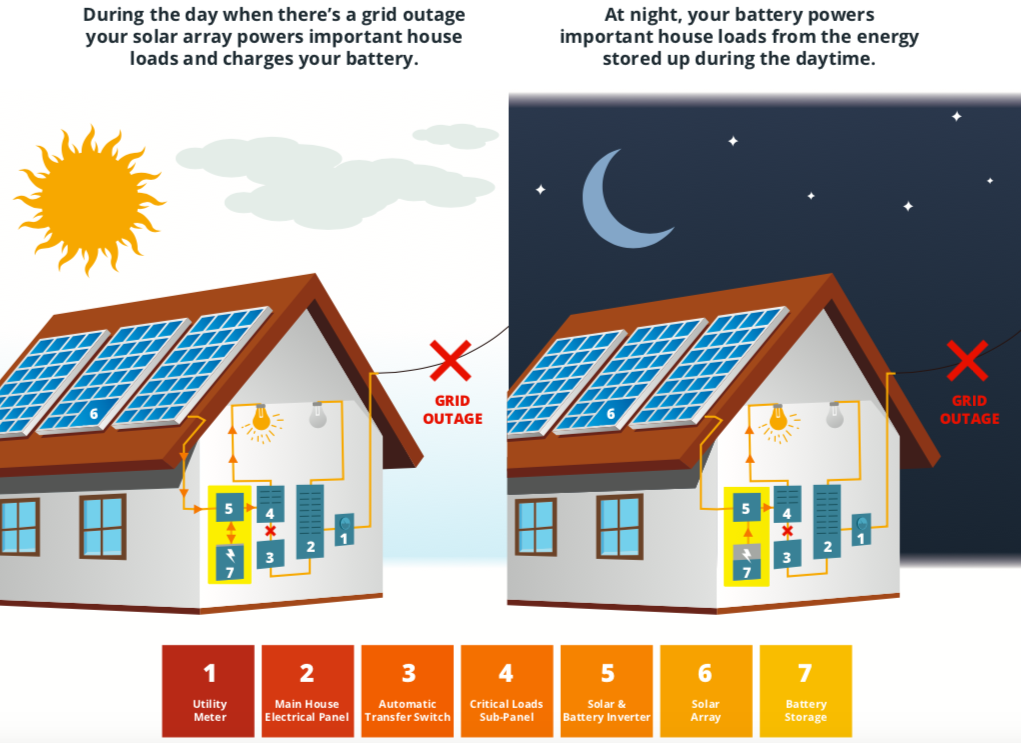
There are two ways to integrate battery storage and solar: DC coupling and AC coupling.
- DC coupling
DC (or Direct Current) coupled systems are most common when installing solar and battery storage at the same time. In this setup, the solar electricity is fed directly into the battery system (in DC form) without the need for any conversion. Often in DC coupled systems, the battery and solar systems share one inverter.
- AC coupling
AC (or Alternating Current) coupled systems are made up of a solar array and battery system that are independent of each other. The AC coupled configuration requires two inverters: one for the solar array (to convert the solar electricity from its natural DC form to AC so that it can flow directly into your home) and one for the battery (to convert the solar electricity back to DC so that it can be used to charge the battery). Typically, the energy produced from your solar system enters your house. Then, any excess electricity is stored in the battery.
When adding batteries to an existing solar array, many systems will be AC coupled. This allows you to keep your existing solar inverter and wiring. You’ll need to add a second inverter to the existing solar inverter.
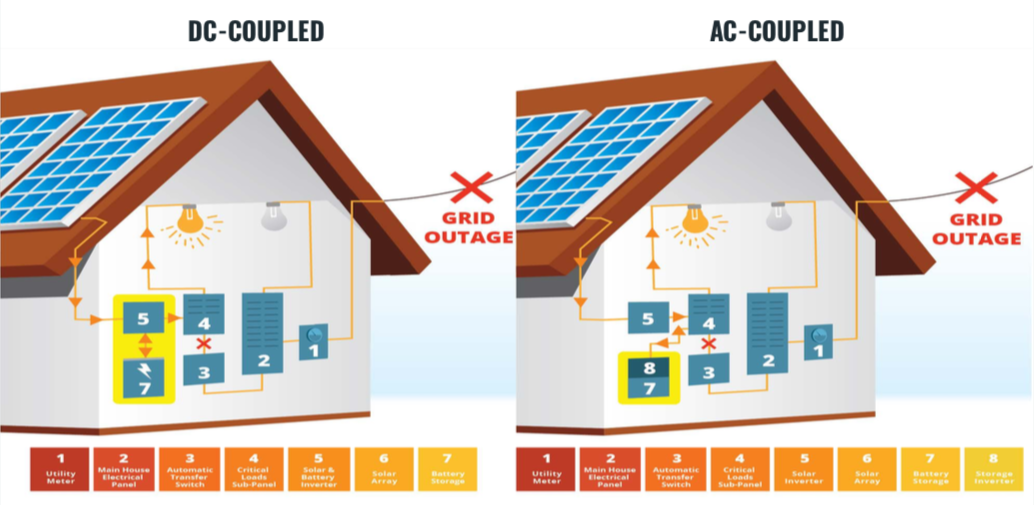
Installing Storage
Lead acid batteries
Lead acid batteries are generally installed indoors because they have a preferred charging and discharging temperate range of 50°F to 80°F. While you can operate lead acid batteries outside of this temperature range, it will reduce the system’s lifespan and efficiency.
Lead acid batteries are also less energy dense than lithium ion systems. This means they will take up more space per installed kW or kWh unit. A single lead acid battery takes up about as much space as a shoebox. Multiple batteries are strung together to make a system large enough to power multiple loads in your home. Lead acid batteries must also be connected to a separate wall-mounted inverter.
Lithium-ion batteries
Lithium ion (or Li-ion) batteries have a wider preferred temperature operating range, typically between 32°F to 100°F. These systems are more energy dense than lead acid batteries and are typically contained in one singular unit. Depending on the manufacturer, Li-ion batteries may or may not contain an integrated inverter. This further reduces the space required for these types of systems.
With lithium ion’s wider temperature range and smaller footprint, some manufacturers have designed systems that can be installed outdoors, typically mounted on the side of your home near your electric meter or solar connection. If you live in a climate with extreme seasonal temperature swings, you may want to install the battery indoors to maximize operating efficiency and battery life. Your local building codes may also determine what locations are allowed in your area.
How much space will I need in my home?
The amount of space needed depends on how much storage you want and can afford to cover your needs while the grid is out. The chemistry also matters. Sealed lead acid batteries can take up more space and require a custom or pre-made cabinet. Lithium ion batteries are pre-wired and often come in a wall or floor-mounted enclosure or cabinet. Another important factor is where your critical loads sub-panel will be located. This is the electric panel that will contain all the circuits in your home that will be powered by the battery bank when the power is out.
If you live in an area that experiences flooding, it is important that you check with your installer on the safest location for your battery to be installed. Your local building codes may also have related requirements.
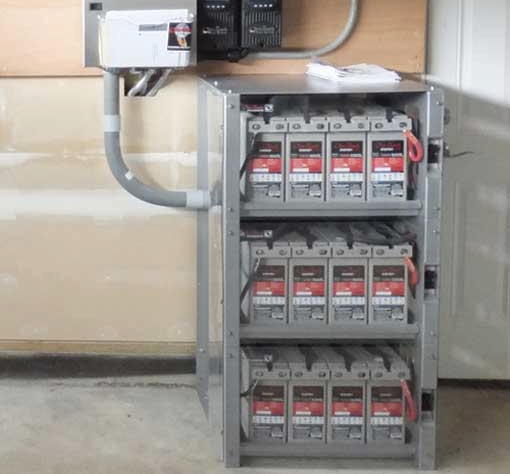
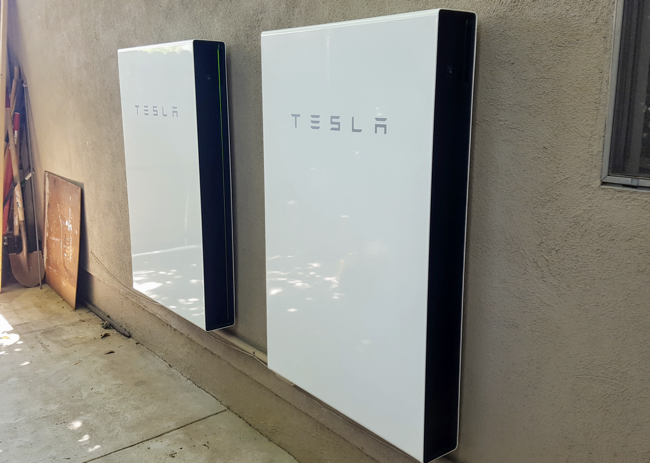
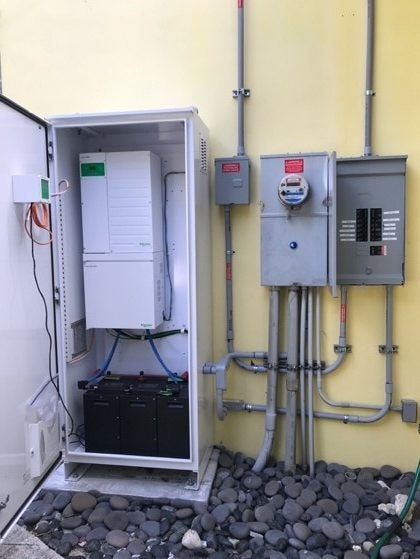
Smart inverters are a vital, yet overlooked, piece of the battery storage system. Smart inverters have the ability to manage when and how your batteries run. All battery storage systems require an inverter and will be programmed to run based on your preferences and needs.
Some batteries come with an integrated smart inverter, designed to give the battery owner more programming control over when and how their battery is used. As opposed to standard inverters that are programmed to work in a predictable, static manner, smart inverters can be programmed via mobile apps and web portals to run when it makes the most sense, given physical, financial, or owner-preference signals.
If your utility offers a rate structure or special program that allows storage to provide you economic value, batteries can be programmed with their smart inverter to take advantage of these rates. However, in most utility territories there is not yet an economic incentive for storage, and storage is only used for backup power.
Warranties for batteries take two forms: number of guaranteed operational years or number of guaranteed cycles. A cycle refers to the battery being discharged and then re-charged. The number of cycles used in a year will depend on how you operate your storage system. For instance, if your system is only used to provide backup power during grid outages, you may only cycle your batteries a few times a year. However, if you configure your storage system to maximize self-consumption of any solar electricity you produce, your storage system may cycle once a day.
On average, lithium ion batteries are under warranty for 10 years or for 7,500 to 10,000 cycles. Lead acid batteries are under warranty for much less time, typically 2 to 5 years.
Just as we recommend with solar, it’s a good idea to let your insurer know that you plan on installing a battery system. This way, your system can be added as an additional appliance in your home that is covered. Installing battery storage should not change your insurance payments.
Your local permitting office will have requirements for how your battery system should be installed. Your installer is responsible for reaching out to them and securing the necessary permits. Because battery systems are relatively new, some local permitting jurisdictions may not have updated their code requirements to include residential battery storage. If there are hurdles along the way, your installer should help you navigate this process.
Some utilities may require interconnection review and approval for battery systems in addition to permitting by the local jurisdiction. Interconnection is the approval process you go through to connect an electrical resource to the electric grid. It is unclear whether utilities will require this step for systems used for battery backup purposes only when the grid is out. This is because residential battery systems are still relatively uncommon and can be used for many different things. This includes providing services to the grid while the grid is working. You can work with your installer to identify your utility’s requirements.
When looking for an installer for battery storage, it’s important to consider their background, experience, and qualifications. Here are a few things you should look for:
- Experience in your area (number of battery installs)
- Experience with the specific technology/equipment you are interested in
- Availability of equipment
- Access to your preferred equipment (if you have a preference)
- Installer workmanship warranties
- NABCEP certification, a common certification for solar installers that includes battery backup knowledge as well
A thorough battery proposal should contain:
- Full cost of the storage system, installation, and additional equipment
- Payment milestones
- Equipment details
- Battery size (kW and kWh)
- Battery model and manufacturer
- Inverter model and manufacturer (if separate from battery)
- Battery management system (if used)
- Critical load sub-panel size and cost
- List of all warranties (battery, inverter, installer workmanship)
- Details of additional work needed (electrical work, inverter swap, etc.)
- Pricing guarantee for all equipment
- Installer information (office location, point of contact, contact information)
Support our work.
Make a tax-deductible donation today to help more people go solar, join together, and fight for their energy rights.
Get the latest on solar straight to your inbox.
Fight for your solar rights.
Everyone has the right to go solar. Spread the sunshine nationwide and in your local community by taking action, joining events, and more.
